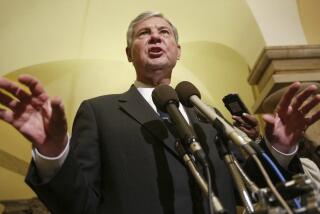Graham indicted in BALCO scandal
U.S. sprinter Justin Gatlin had just finished the news conference after winning the 100 meters at the 2004 Olympics when his coach, Trevor Graham, added a surreal dimension to the celebratory moment.
With Gatlin standing a few feet away in the basement of the Athens Olympic Stadium, Graham told a group of reporters he was the coach who turned in the syringe that triggered the BALCO doping scandal.
An ironic dimension was added Thursday, when a federal grand jury in San Francisco indicted Graham on charges of lying to federal agents investigating the BALCO affair. He faces up to 15 years in prison if convicted.
Gatlin, meanwhile, faces a possible eight-year ban after testing positive for the anabolic steroid testosterone April 22. He is among 10 athletes suspended for doping violations that occurred while Graham was their coach. In addition, Olympic champion Marion Jones has been under suspicion for doping that allegedly occurred while she trained with Graham.
Now that the federal investigation of Graham has ended in the indictment, the U.S. Anti-Doping Agency is likely to charge the coach with a doping offense.
“No one has a license to break sports rules or federal laws just because they turn in a drug dealer to the authorities,” USADA general counsel Travis Tygart said Thursday.
Following USADA policy, Tygart said his comments were not related to a specific case.
In 2003, Graham sent USADA a syringe containing traces of a then-undetectable drug the coach said athletes were getting from BALCO founder Victor Conte. Analysis by the anti-doping lab at UCLA showed the substance was the steroid THG, a drug Illinois chemist Patrick Arnold created for Conte’s clients.
Graham is the sixth person indicted in the BALCO investigation. The other five have been convicted after making deals with prosecutors that kept any of the cases from going to trial.
The question now becomes whether Graham cuts a deal that will prevent a trial in which many of his athletes and former athletes, including Jones and Gatlin, could be called to testify.
Because federal prosecutors had granted Graham immunity in return for his cooperation in the investigation, any deal the government makes now probably will hinge on that cooperation. The indictment specifies Graham was not given immunity from prosecution for making false statements.
Graham’s attorney, Joseph Zeszotarski of Raleigh, N.C., said his client is not guilty and has not made any false statement.
“It is particularly troublesome the government has chosen to take this course when it was Trevor who had the integrity and courage to turn in the sample that led to the BALCO investigation. ... Yet this is how he is rewarded,” Zeszotarski said in a statement.
When he publicly acknowledged having turned in the syringe, Graham said, “I was just a coach doing the right thing at the time. I have no regrets.”
Skeptics contended Graham acted because he was concerned rival athletes were reaping benefits from THG while it was undetectable. He denies giving drugs to his athletes.
The indictment alleges Graham gave illegal performance-enhancing drugs to his athletes after obtaining them from “Source A,” whom published reports have identified as Angel Guillermo Heredia, a shot putter from Laredo, Texas. The indictment says Graham also referred athletes to “Source A” to get the drugs directly from the source.
U.S. Olympic Committee spokesman Darryl Seibel declined comment on the indictment but said, “We’ve already made our position on Mr. Graham clear.”
In August, the USOC banned Graham from using any of its training facilities.
Philip Hersh covers the Olympics for The Times and the Chicago Tribune.
More to Read
Go beyond the scoreboard
Get the latest on L.A.'s teams in the daily Sports Report newsletter.
You may occasionally receive promotional content from the Los Angeles Times.





